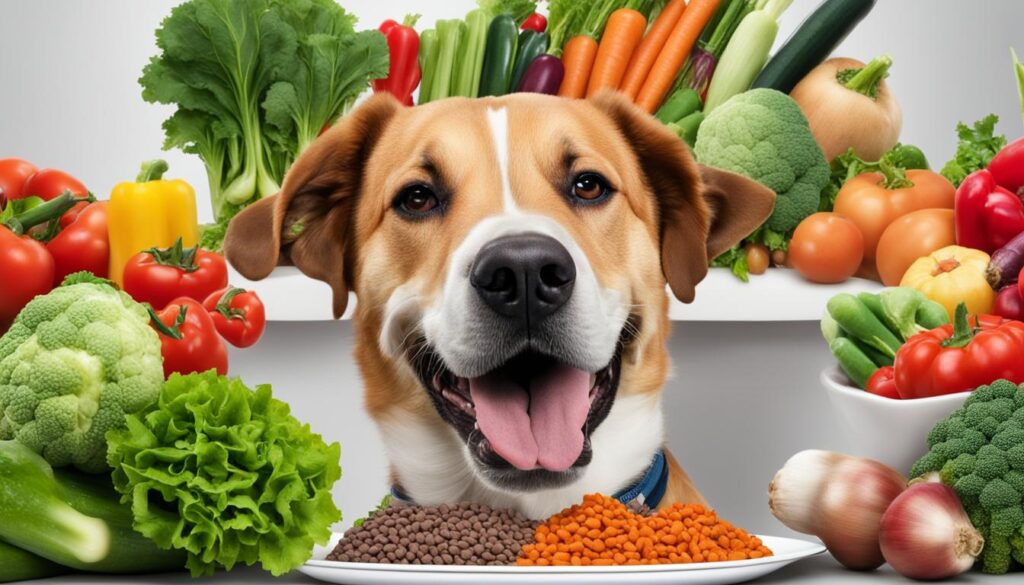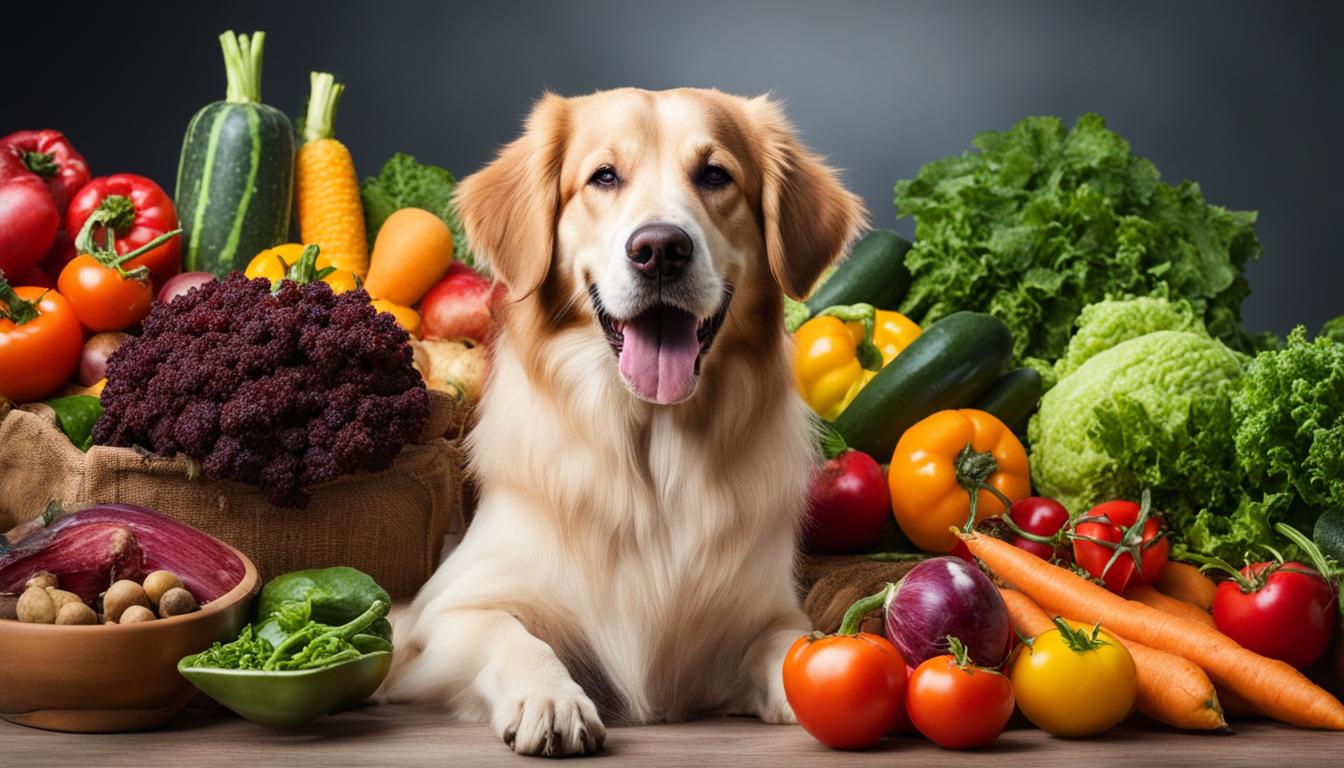Are you considering a vegetarian or vegan diet for your furry friend? While conventional dog foods have been the go-to option for decades, more and more pet owners are exploring alternative diets for their dogs. In this comprehensive overview, we’ll delve into the world of vegetarian and vegan diets for dogs, discussing their nutritional needs and potential health benefits.
Dogs, like humans, have unique nutritional requirements, and it’s essential to ensure that their diet meets these needs. We’ll explore the importance of balancing protein sources and the inclusion of essential nutrients like taurine in vegetarian and vegan dog diets. Additionally, we’ll address common health considerations, such as food allergies and the potential risks associated with these diets.
Whether you’re considering commercially available vegan dog food brands or want to try out homemade recipes, we’ll provide guidance on transitioning your dog to a vegetarian or vegan diet. We’ll also discuss the importance of monitoring your dog’s health and consulting with a veterinary nutritionist for a properly balanced diet.
While there is ongoing debate and limited long-term data on the effects of vegetarian and vegan diets for dogs, we’ll highlight reported health benefits and cautionary notes to help you make an informed decision. Join us as we explore the world of vegetarian and vegan diets for dogs and uncover the potential benefits and risks.
Key Takeaways:
- Vegetarian and vegan diets for dogs are gaining popularity among pet owners.
- It is crucial to ensure that these diets meet the dogs’ nutritional needs, including adequate protein sources and essential nutrients.
- A gradual transition is recommended when switching a dog to a vegetarian or vegan diet to avoid gastrointestinal upset.
- Monitoring your dog’s health and consulting with a veterinary nutritionist is important to ensure the diet is properly balanced.
- While there are potential health benefits, such as reduced risk of certain ailments and relief from food allergies, risks and deficiencies must be considered.
Health Considerations for Dog Vegetarian/Vegan Diets
When it comes to feeding your dog a vegetarian or vegan diet, it’s important to understand the potential health considerations. Dogs are facultative carnivores, which means they can consume plant-based foods, but their dietary requirements differ from humans. Properly balancing their nutritional needs is key to ensuring their well-being.
Protein is a vital component of a dog’s diet, and it’s essential to include adequate protein sources in a vegetarian or vegan dog diet. Plant-based proteins such as soy, corn protein, wheat protein, and pea protein can be included, but it’s crucial to ensure they provide all the essential amino acids and nutrients dogs require. Taurine, for example, is an amino acid that dogs need, and it’s important to ensure they receive enough in their diet.
Furthermore, a vegan diet for dogs can be beneficial for those with allergies. Certain animal-based proteins can trigger allergic reactions in dogs, and a vegan diet can help alleviate these allergies. By eliminating potential allergens, dogs may experience relief and improved overall well-being.
Vegan diets for dogs can be a healthy choice if properly balanced. It’s important to ensure your dog is receiving sufficient protein and essential nutrients. Consulting with a veterinary nutritionist can help you design a vegan diet that meets your dog’s specific needs.
Overall, it’s essential to carefully consider the health considerations when feeding your dog a vegetarian or vegan diet. By paying attention to protein sources, essential nutrients, and potential allergens, you can provide a nutritionally sound diet for your furry friend.
| Health Considerations for Dog Vegetarian/Vegan Diets | |
|---|---|
| Consideration | Explanation |
| Protein Sources | Include adequate plant-based protein sources to meet your dog’s nutritional needs. |
| Amino Acid Balance | Ensure the diet provides all essential amino acids, including taurine. |
| Allergies | A vegan diet can help alleviate allergies triggered by animal-based proteins. |
Nutritional Needs in Dog Vegetarian/Vegan Diets
Dogs have specific nutritional needs that must be met in a vegan diet to ensure their health and well-being. Adequate protein intake is crucial, as it provides essential amino acids that dogs require for proper growth, muscle development, and overall health. When following a vegetarian or vegan diet for your dog, it is important to carefully select and balance protein sources to ensure they provide all necessary amino acids.
Common plant protein sources used in vegan dog diets include soy, corn protein, wheat protein, pea protein, and more. These protein sources can be used individually or combined to create a balanced and complete protein profile. It is essential to ensure that the protein sources used in your dog’s diet provide all the essential amino acids they need.
Commercially available vegan dog food brands can be a convenient option for ensuring that your dog’s nutritional needs are met. These brands have formulated their products to provide a complete and balanced diet for dogs on a vegetarian or vegan diet. It is important to choose reputable brands that have undergone feeding trials and meet nutritional standards recommended by organizations like AAFCO.
Nutritional Needs in Dog Vegetarian/Vegan Diets Table
| Protein Source | Essential Amino Acids | Benefits |
|---|---|---|
| Soy | Tryptophan, lysine, methionine | Complete protein source, high in essential amino acids |
| Corn Protein | Tryptophan, lysine, histidine | Good source of essential amino acids, easily digestible |
| Wheat Protein | Lysine, methionine, cysteine | Provides necessary amino acids for muscle development |
| Pea Protein | Lysine, arginine, phenylalanine | High protein content, easily digestible |
While plant-based protein sources can be used in a vegan dog diet, it is important to note that dogs have specific dietary requirements that cannot be met through plant sources alone. Essential nutrients such as vitamins, minerals, and fatty acids also need to be carefully considered and included in your dog’s diet. Regular monitoring of your dog’s health, including wellness exams and blood work, can help ensure that their nutritional needs are being met on a vegan diet.

Benefits of Homemade Vegan Dog Food Recipes
Making homemade vegan dog food recipes allows you to have complete control over the ingredients and quality of the food you are feeding your dog. You can ensure that they are receiving a balanced and nutritious diet that meets their specific needs. Additionally, homemade recipes can provide a variety of flavors and textures that can keep your dog excited about mealtime.
However, it’s crucial to remember that creating a balanced vegan diet for your dog requires careful attention to their nutritional needs. Protein sources, essential amino acids, vitamins, and minerals must be appropriately balanced to avoid deficiencies. Consulting with a veterinary nutritionist can provide you with guidance and support in formulating homemade vegan dog food recipes that meet your dog’s requirements.
| Benefits of Transitioning to a Vegan Diet | Precautions and Considerations |
|---|---|
| 1. Reduced risk of certain urinary tract ailments | 1. Ensure adequate protein intake |
| 2. Relief from allergies caused by food proteins | 2. Monitor for any signs of nutrient deficiencies |
| 3. Consult with a veterinary nutritionist |
“Transitioning your dog to a vegan diet can be a rewarding journey that promotes their overall health and well-being. Just remember to take it slow, monitor their health, and consult with professionals for the best results.”
In conclusion, transitioning your dog to a vegan diet requires careful planning, gradual adjustment, and monitoring their health closely. Homemade vegan dog food recipes can provide a variety of nutritious options, but it’s important to ensure that they are properly balanced and meet your dog’s nutritional needs. By taking these steps and consulting with professionals, you can successfully transition your dog to a vegan diet while keeping their well-being and health a top priority.
Health Benefits of Dog Vegetarian/Vegan Diets
While there is ongoing debate about the appropriateness of vegetarian and vegan diets for dogs, there are reported health benefits associated with these diets. One of the main benefits is a reduced risk of certain urinary tract ailments. Plant-based diets can help create an environment in the urinary tract that is less conducive to the formation of stones and crystals, reducing the chances of urinary tract infections and other related issues.
Another potential benefit is relief from allergies caused by food proteins. Dogs with allergies to animal-based proteins may find relief by switching to a vegan diet. By eliminating common allergens like chicken, beef, and dairy, dog owners have reported a reduction in skin irritation, itching, and other allergic symptoms.
Vegan dog treats and supplements can also be incorporated into a dog’s diet to provide additional nutrients and variety. These treats and supplements can ensure that the dog’s nutritional needs are met and help address any potential deficiencies that may arise from a vegan diet. However, it’s important to choose treats and supplements that are specifically formulated for dogs and meet their unique dietary requirements.
Table: Comparison of Health Benefits in Dog Vegetarian/Vegan Diets
| Health Benefit | Description |
|---|---|
| Reduced risk of urinary tract ailments | Vegan diets can help create an environment in the urinary tract that is less conducive to the formation of stones and crystals, reducing the chances of urinary tract infections and other related issues. |
| Allergy relief | Vegan diets can help alleviate allergies caused by food proteins, such as chicken, beef, and dairy, leading to a reduction in skin irritation, itching, and other allergic symptoms. |
| Additional nutrients and variety | Vegan dog treats and supplements can be incorporated into a dog’s diet to provide essential nutrients and variety, ensuring their nutritional needs are met on a vegan diet. |
Monitoring Your Dog’s Health on a Vegetarian/Vegan Diet
Feeding your dog a vegetarian or vegan diet requires careful monitoring to ensure their health and well-being. Regular check-ups and blood work are essential to assess their overall health and address any specific nutritional needs. It is recommended to schedule wellness exams at least twice a year to closely monitor their progress and make any necessary adjustments to their diet.
A complete vegan dog nutrition guide can serve as a valuable resource in ensuring that your dog’s diet is properly balanced and provides all the necessary nutrients. This guide will outline the specific protein sources to include in their diet, as well as other essential nutrients they may need, such as vitamins and minerals. By following this guide, you can be confident that your dog is receiving a nutritionally complete diet.
| Aspects to monitor | Frequency |
|---|---|
| Wellness exams | Twice a year |
| Blood work | As recommended by your veterinarian |
In addition to regular monitoring, it’s important to be aware of the potential health benefits of a vegan dog diet. Many dog owners have reported reduced instances of certain urinary tract ailments and relief from allergies caused by food proteins. However, it’s important to note that individual results may vary, and it’s always best to consult with your veterinarian.

By staying vigilant and following a complete vegan dog nutrition guide, you can ensure that your furry friend’s health is properly monitored and their nutritional needs are met on a vegetarian or vegan diet.
Risks and Cautionary Notes for Dog Vegetarian/Vegan Diets
Feeding your dog a vegetarian or vegan diet may seem like a compassionate choice, but it’s important to be aware of the potential risks and challenges associated with these diets. While it is possible to meet a dog’s nutritional needs on a vegetarian or vegan diet, it requires careful planning and consideration.
One of the main concerns with vegetarian and vegan diets for dogs is the risk of inadequate protein intake. Dogs require a sufficient amount of high-quality protein to thrive, and plant-based protein sources may not always provide all the essential amino acids they need. This can lead to nutritional deficiencies and health problems if not addressed.
Additionally, the imbalances in essential amino acids and deficiencies in vitamins and minerals in vegetarian or vegan diets can have serious and irreversible consequences for your dog’s health. It is crucial to ensure that the diet is properly formulated to meet their specific nutritional needs. Consulting with a veterinary nutritionist can provide valuable guidance in formulating a balanced diet.
Feeding dogs a vegetarian or vegan diet carries certain risks, including inadequate protein intake, imbalances in essential amino acids, and deficiencies in vitamins and minerals.
When considering vegetarian or vegan diets for dogs, it’s essential to choose commercially available vegan dog food brands that have undergone feeding trials and meet the nutritional standards recommended by organizations like AAFCO. These brands have been formulated to provide a balanced and complete diet for dogs and can help ensure that your pet’s nutritional needs are met.
Remember, not all dogs are suitable candidates for vegetarian or vegan diets. Puppies, kittens, and dogs or cats that you plan to breed should never be fed a vegetarian or vegan diet, as it may lead to growth and developmental issues. It is crucial to consult with your veterinarian before making any dietary changes for your pet to ensure their health and well-being are not compromised.
| Concerns | Recommendations |
|---|---|
| Inadequate Protein Intake | Ensure sufficient high-quality plant-based protein sources and consult with a veterinary nutritionist. |
| Imbalances in Essential Amino Acids | Choose commercially available vegan dog food brands that meet nutritional standards. |
| Deficiencies in Vitamins and Minerals | Formulate a properly balanced diet and consult with a veterinary nutritionist for guidance. |
| Unsuitable for Puppies, Kittens, and Breeding Dogs/Cats | Never feed vegetarian or vegan diets to these animals as it may lead to growth and developmental issues. |
Conclusion
So, you’re considering a vegetarian or vegan diet for your furry friend? It’s a personal choice driven by various beliefs and values. While there is ongoing debate and limited data on the long-term effects, rest assured that with careful consideration, you can safely feed your dog a balanced vegetarian or vegan diet.
By understanding your dog’s nutritional needs and using commercially available vegan dog food brands or carefully formulated homemade recipes, you can ensure they receive all the necessary nutrients. Don’t forget to regularly monitor their health and consult with a veterinary nutritionist to guarantee the diet is adequate and complete.
Whether you choose to explore homemade vegan dog food recipes or follow a complete vegan dog nutrition guide, remember that your dog’s well-being is the top priority. So, go ahead and embark on this journey with your loyal companion, ensuring their diet aligns with your values and provides them with the nourishment they need. After all, their health and happiness are in your hands!
FAQ
Are vegetarian and vegan diets nutritionally sound for dogs?
While there is limited data on the long-term effects of these diets on dogs’ health, there is little evidence of adverse effects so far. It is crucial to ensure that vegetarian and vegan dog diets are nutritionally sound and meet the dogs’ nutritional needs.
Can dogs consume plant-based foods?
Dogs, unlike cats, are facultative carnivores, which means they can consume plant-based foods. However, they need to be fed carefully to avoid nutritional deficiencies.
What are the essential nutrients that should be considered in a vegan dog diet?
Dogs require adequate protein sources, including amino acids like taurine. Balancing protein sources and considering essential nutrients like taurine is important in designing these diets to ensure adequacy.
What are some protein sources in a vegan dog diet?
Various plant protein sources such as soy, corn protein, wheat protein, pea protein, and more can be included in a vegan dog diet.
How can I transition my dog to a vegan diet?
Transitioning a dog to a vegan diet should be done gradually to avoid gastrointestinal upset. Start by slowly incorporating small amounts of plant-based foods into their current diet and gradually increase the proportion over several weeks.
What are the reported health benefits of vegan diets for dogs?
Some reported health benefits include a reduced risk of certain urinary tract ailments and relief from allergies caused by food proteins.
How can I monitor my dog’s health on a vegan diet?
Regular monitoring of a dog’s health is essential when feeding them a vegetarian or vegan diet. This includes scheduling more frequent wellness exams, at least twice a year, and conducting blood work to ensure the dog’s overall health and specific nutritional needs are being met.
What are the risks of feeding dogs a vegetarian or vegan diet?
Risks include inadequate protein intake, imbalances in essential amino acids, and deficiencies in vitamins and minerals. These dietary problems can lead to serious and irreversible medical conditions.





